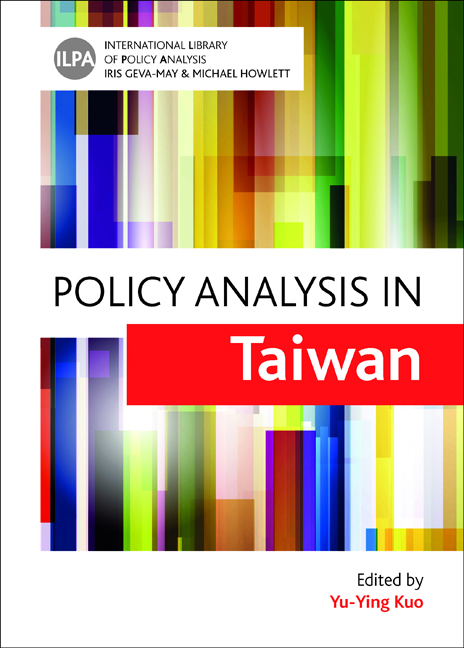Book contents
- Frontmatter
- Contents
- List of tables and figures
- Acknowledgements
- Notes on contributors
- One Policy analysis in a time of turbulence
- Two Exploring policy advisory committees in the central government
- Three Analysis of innovative local government policies in Taiwan
- Four Policy analysis in the legislative body: the legislative process of the Soil and Groundwater Pollution Remediation Act in Taiwan
- Five Policy analysis in the local councils
- Six Gendering policy analysis? The problems and pitfalls of participatory ‘gender impact assessment’
- Seven The power of influencing policies, or getting their share and more: interest groups in Taiwan
- Eight Think tanks in Taiwan
- Nine The development of public engagement in Taiwan
- Ten Social media and policy evolution in Taiwan
- Eleven Policy analysis by non-governmental organisations in Taiwan
- Twelve Policy network of universal healthcare reform in Taiwan
- Thirteen Public policy and administration research
- Fourteen Too critical to ignore? A tri-dimensional relationship examination of policy analysis internship in Taiwan
- Fifteen Policy analysis in Taiwan in an international perspective
- Sixteen Policy analysis education in Taiwan: a comparative perspective
- Index
Eleven - Policy analysis by non-governmental organisations in Taiwan
Published online by Cambridge University Press: 11 March 2022
- Frontmatter
- Contents
- List of tables and figures
- Acknowledgements
- Notes on contributors
- One Policy analysis in a time of turbulence
- Two Exploring policy advisory committees in the central government
- Three Analysis of innovative local government policies in Taiwan
- Four Policy analysis in the legislative body: the legislative process of the Soil and Groundwater Pollution Remediation Act in Taiwan
- Five Policy analysis in the local councils
- Six Gendering policy analysis? The problems and pitfalls of participatory ‘gender impact assessment’
- Seven The power of influencing policies, or getting their share and more: interest groups in Taiwan
- Eight Think tanks in Taiwan
- Nine The development of public engagement in Taiwan
- Ten Social media and policy evolution in Taiwan
- Eleven Policy analysis by non-governmental organisations in Taiwan
- Twelve Policy network of universal healthcare reform in Taiwan
- Thirteen Public policy and administration research
- Fourteen Too critical to ignore? A tri-dimensional relationship examination of policy analysis internship in Taiwan
- Fifteen Policy analysis in Taiwan in an international perspective
- Sixteen Policy analysis education in Taiwan: a comparative perspective
- Index
Summary
Introduction
Like all other organisations, non-governmental organisations (NGOs) or non-profit organisations (NPOs) vary greatly in terms of mission, size, target, mode of operation and social impact. They also differ in regard to policy involvement and relationship with government. Due to the diversity of NGOs, it is difficult for researchers to define the term precisely. As a result, there are various interpretations in practice. For example, according to the United Nations (UN), any kind of private organisation that is independent from government control can be termed a ‘non-governmental organisation’, provided it is not-for-profit, not criminal and not simply an opposition political party. The World Bank (WB) defines them as ‘private organizations that pursue activities to relieve suffering, promote the interests of the poor, protect the environment, provide basic social services or undertake community development’ (World Bank, 1995: 13).
The World Bank further identifies two broad groups of non-governmental organisations: operational NGOs, which focus on development projects, and advocacy NGOs, which are organised to promote particular causes. In fact, certain NGOs may fall under both categories simultaneously. One of the differences between operational NGOs and advocacy NGOs is that the former may accept aid from the government, while the latter tend to reject government subsidies, otherwise they might not dare to criticise the government directly. Although a lot of NGOs are devoted to delivering services to their clients – they are social service driven – policy advocacy is also an important activity for them. In this chapter, our discussion will focus on the development of policy analysis by advocacy NGOs in Taiwan.
In the broadest meaning, the term advocacy NGOs is normally used to refer to any non-profit, voluntary citizens’ organisations which come together around specific issues and are independent from government. They promote the public interest and advocate social values. In other words, advocacy NGOs perform a variety of service and humanitarian functions, bring citizen concerns to governments, advocate and monitor policies and encourage political participation through empowerment and provision of information. Their relationship with government differs depending on their goals, the services they provide, their sources of funding, strategies, regulation by government and so on.
Policy advocacy is a communication and promotion process by an individual or organisation which normally aims to influence public opinions, public policies and resource allocation decisions during the public policy formulation and implementation process.
- Type
- Chapter
- Information
- Policy Analysis in Taiwan , pp. 151 - 170Publisher: Bristol University PressPrint publication year: 2015



